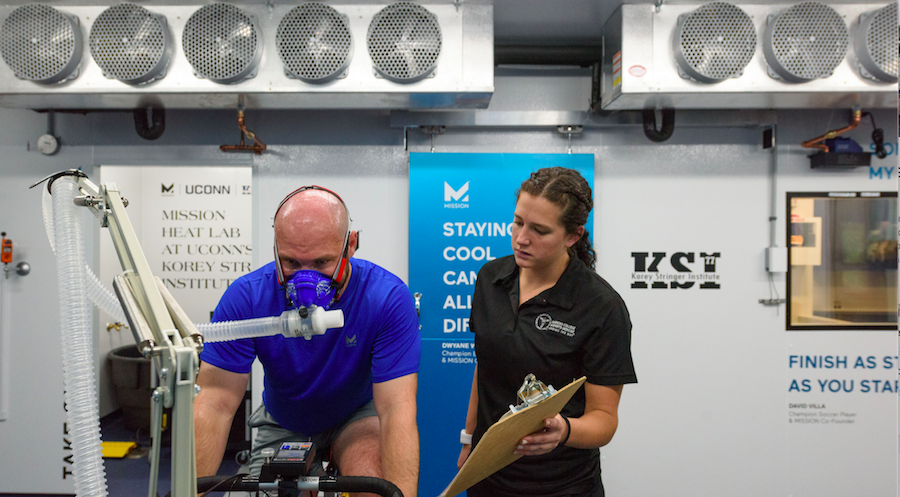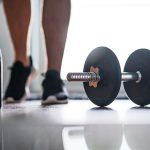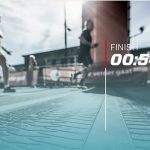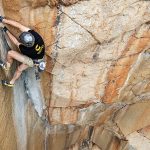UConn’s Korey Stringer Institute and Mission have teamed up to open one of the nation’s premiere academic heat research labs at the University of Connecticut’s main campus in Storrs, CT.
Outfitted with the latest in climate control technologies and human performance monitoring systems, the Mission Heat Lab at UConn’s Korey Stringer Institute will allow researchers to explore new ways to improve human performance, endurance, and safety in the heat.
“Exertional heat stroke is a constant concern for athletes, active military personnel, laborers, and others who are called on to perform in hot conditions,” says UConn Professor Douglas Casa, a national expert on heat stroke and chief executive officer of the Korey Stringer Institute. “This lab will increase our understanding of heat illness and how body temperature impacts performance. It will also help us develop better methods for cooling, which is an important part of our commitment to keeping athletes, warfighters, and laborers safe.”
The partnership between the Korey Stringer Institute and Mission is a natural one. Named after a Minnesota Vikings lineman who died from exertional heat stroke in 2001, the Korey Stringer Institute (KSI) is the nation’s leading sports safety research and advocacy organization specializing in heat illness research. Mission is a pioneer in the development of temperature-controlling technologies for athletic and active accessories and gear. Co-founded by some of the world’s greatest athletes including Serena Williams, Dwyane Wade, Carli Lloyd, and David Villa in 2009, Mission is dedicated to providing athletes, workers and active individuals at all levels with solutions to maximize performance and optimize safety in the heat.
The Mission Heat Lab at UConn features a first-of-its-kind cooling area that will allow researchers to monitor how the human body responds to different cooling treatments after experiencing heat-related stress and conditions.
“Rooted in sports and science, Mission works with professional athletes, scientists, and medical doctors to deliver game-changing temperature-control technologies that enhance performance, safety and comfort,” says Josh Shaw, founder and CEO of Mission. “Since 2014, we’ve been working hand-in- hand with the KSI and we are thrilled to sponsor the new state-of-the-art Mission Heat Lab. For the next 10 years, the Mission Heat Lab will set new standards in research, development, and testing to combat heat related illness for athletes, workers, military, and active individuals — globally. As the market leader for cooling technologies, the new Mission Heat Lab is yet another testament to our commitment to combatting the dangerous effects on everyone who lives, works, and plays in the heat.”
Located within UConn’s Gampel Pavilion sports arena, the Mission Heat Lab is capable of creating a broad range of environmental conditions. High-end exercise bikes and treadmills along with advanced temperature controls will allow researchers to mimic specific environments for races, competitions, and events – from a hilly 10K New England road race on a cloudy 70 degree day with 40 percent humidity to a stifling hours-long military march in 100 degree heat under hot sun with 90 percent humidity. Radiant heat panels being installed later this year will further enhance lab simulations.
A full suite of continuous physiological monitoring systems will capture a test subject’s heart rate, internal temperature, skin temperature and other vital signs hundreds of times per second. The test chamber also includes restroom facilities and resting areas designed to allow test subjects to remain in a designated environment for hours at a time without the need for outside breaks that might skew data regarding how their body is reacting to conditions.
Private donations supported the lab’s creation. One of those donors was Carole Knighton, whose son, Hunter, nearly died of exertional heat stroke during a 2014 football practice at the University of Miami. Hunter, whose body temperature was reportedly 109 degrees when he collapsed, spent two weeks on a ventilator in a medically induced coma, but ultimately survived the ordeal.
“This is a cause that is near and dear to my heart,” says Knighton, who lives in Fort Myers, Florida. “If it were not for the Korey Stringer Institute, my son would not be where he is today.”
With a desire to return to football, Hunter, now 23, visited the Korey Stringer Institute on several occasions to have his heat tolerance tested. In the process, he and his family learned a lot about heat illness and how it can be avoided. Winner of the 2015 Brian Piccolo Award for being the “most courageous” football player in the Atlantic Coast Conference, Hunter now plays for Tulane.
The Mission Heat Lab will be available for use by outside companies and organizations to maximize research opportunities in heat safety awareness as well as other areas of temperature-related studies.
Photo courtesy Mission















